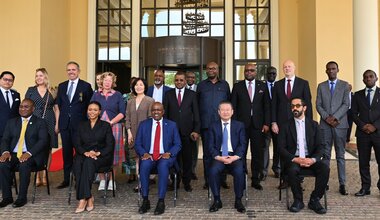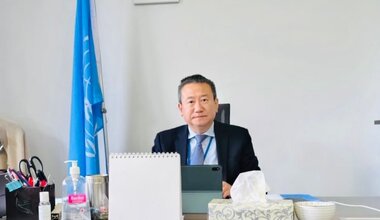Special Envoy Huang Xia Briefs UN Security Council on Renewed Diplomatic Momentum and Urgent Need for Ceasefire in Eastern DRC
New York, 13 October 2025 - In a public session of the United Nations Security Council, Huang Xia, the UN Special Envoy for the Great Lakes Region, delivered a comprehensive update on recent developments in the region, highlighting both encouraging diplomatic progress and the urgent need for renewed efforts to halt the ongoing conflict in eastern Democratic Republic of the Congo (DRC). Mr. Xia was briefing the Security Council from the Togolese capital Lome, where he attended the second edition of the Lome Peace and Security Forum (LPSF 2025) on 11-12 October 2025.
Since his last briefing in April, Mr. Xia noted that significant diplomatic strides have been made, generating real hope for a ceasefire and a sustainable resolution to the crisis. He commended the United States for its facilitation of the Washington Peace Agreement, signed on 27 June between the DRC and Rwanda. This agreement has led to the establishment of operational mechanisms, including plans for the neutralization of the Democratic Forces for the Liberation of Rwanda (FDLR) and the lifting of Rwanda’s defensive measures, set to begin implementation from 1 October 2025.
Mr. Xia also praised Qatar’s tireless mediation efforts, which resulted in the signing of a Declaration of Principles on 19 July 2025 and an agreement on a prisoner exchange mechanism in early September. He expressed hope that negotiations between the DRC authorities and the M23 would resume swiftly and culminate in a comprehensive peace agreement.
In a major regional development, Mr. Xia welcomed the African Union-led regional peace processes, with the merger of the Nairobi and Luanda tracks under the leadership of Togolese President Faure Gnassingbé, supported by a panel of five facilitators and former heads of State. A joint technical secretariat is being established in Addis Ababa under the auspices of the AU Commission.
Despite these promising initiatives, Mr. Xia warned that the agreed ceasefire has not been respected. Following a brief lull, military operations have resumed, exacerbating an already dire humanitarian situation marked by restricted humanitarian access, serious human rights violations, and increased displacement. He echoed concerns raised by Special Representative and Head of MONUSCO, Bintou Keïta, about the deteriorating security landscape, particularly the shift of front lines toward South Kivu, which poses a grave risk of regional destabilization.
In response to this alarming context, Mr. Xia outlined four key priorities:
- An immediate, effective, and unconditional ceasefire, with all parties respecting Security Council resolutions and commitments under the Washington and Doha agreements.
- Robust political and technical support for the implementation of these agreements, with the UN system — including MONUSCO, UNOAU, UNOCA, and the Office of the Special Envoy — coordinating efforts to provide comprehensive and complementary support.
- Strengthening African-led mediation, with continued engagement from the UN to support the AU and regional leaders, including Presidents João Lourenço of Angola and Gnassingbé, and the panel of facilitators.
- Addressing the root causes of the conflict, with renewed commitment to the 2013 Addis Ababa Framework Agreement, which remains a central tool for accountability and sustainable peace.
Mr. Xia concluded by urging the Security Council to fully support these efforts, recognize the regional dimensions of the conflict, and use its influence to ensure the implementation of Resolution 2773 (2025). He reaffirmed his commitment to working with all stakeholders to promote peace, cooperation, and stability in the Great Lakes region
 UN
UN





